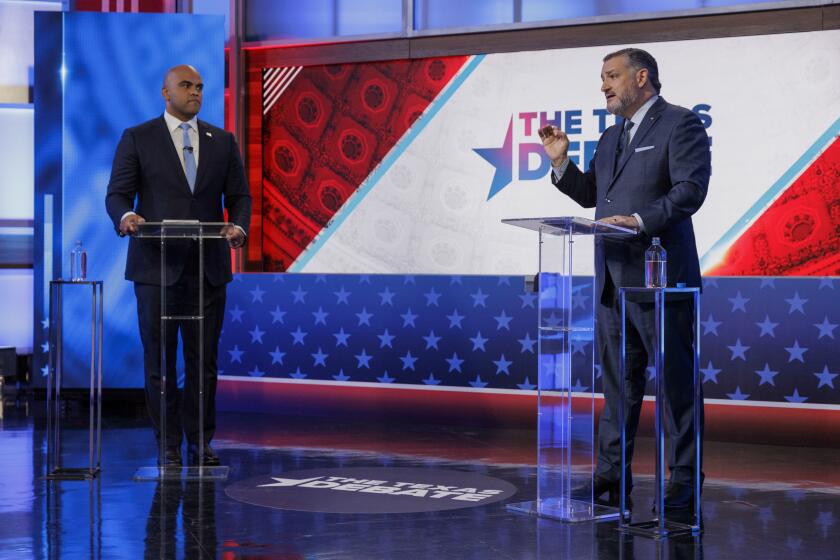Bosnia’s Ethnic Rivals Clash at Last-Chance Peace Talks : Balkans: Impasse dims hopes for reaching accord before Christmas. Sarajevo airlift is suspended.
As the humanitarian crisis in Bosnia-Herzegovina deepened Tuesday with new fighting and a suspension of the Sarajevo airlift, leaders of the warring factions clashed at last-chance talks over how to end the 20-month-old bloodletting.
Representatives of Bosnia’s Serbs, Croats and the Muslim-led government met in Geneva to haggle over the last details of a partition plan aimed at stopping the war by segregating the population into ethnic enclaves.
The presidents of Serbia and Croatia agreed to cede some territory to the government, but a spokesman for the Sarajevo leadership said the offer was rejected.
“All the concessions have been made on territories which do not belong to the Muslim population,” spokesman Mirza Hajric told reporters in Geneva. “We did not get anything we asked.”
While the reported impasse at this latest round of talks seemed to dash hopes of a peace accord before Christmas, the Bosnian leaders were to resume negotiations at European Community headquarters here today amid mounting pressure from the international community for a settlement.
Even Serbian President Slobodan Milosevic, who stands accused of instigating the Balkan conflict, insisted as he left the Geneva forum that “those problems can be solved.”
While the leaders met, Serb rebels and the Bosnian army traded heavy artillery fire in western reaches of the capital, a U.N. spokesman said in Sarajevo.
Six machine-gun rounds fired from the Serb-held suburb of Ilidza struck a U.N. transport plane at Sarajevo’s airport, prompting the U.N. High Commissioner for Refugees to indefinitely suspend relief flights into the city.
Because Sarajevo is cut off by Serbian artillery, nearly all of the besieged capital’s 380,000 residents depend on the daily airlifts of food for survival.
Through more than a year of peace talks, the Bosnian government has held out against a carve-up that would preclude restoration of the multicultural republic that existed before Serb nationalists rebelled against independence in April, 1992.
But Muslim President Alija Izetbegovic capitulated in September to the principle of partitioning, on condition that the rump state left for Bosnia’s Muslims and proponents of integration cover at least one-third of republic territory and include access to the Adriatic Sea.
Milosevic, whose quest for a Greater Serbia sparked Serbian rebellions in both Bosnia and Croatia, has lately shown interest in halting the fighting in hopes of getting harsh U.N. sanctions lifted from his own country.
Sanctions were imposed in May, 1992, to dissuade Belgrade from bankrolling the Serbian insurrections, and they have compounded an economic disaster caused by uncontrolled money-printing to finance the proxy wars.
Lord Owen of the European Community and U.N. envoy Thorvald Stoltenberg have been applying intense pressure on all sides over the past two weeks to force the concessions needed for an ethnic carve-up.
Croatian President Franjo Tudjman said after Tuesday’s discussions that a new formula for division had been worked out with Milosevic, in collaboration with their Bosnian proxies.
Under the revised plan, Bosnia’s Muslim Slavs, who made up 44% of the population before the war but have been decimated by expulsions and casualties, would get territory covering about 33% of the republic.
Serbs who have seized 70% of the republic would retain half of Bosnia, or about three-quarters of the land they have conquered and “ethnically cleansed.”
Bosnian Serb leader Radovan Karadzic, who along with Milosevic stands accused of war crimes by the U.S. State Department, exuded confidence upon arrival, telling reporters, “This time I think we can make it.”
Croatian rebels led by Mate Boban would control about 17% of Bosnian territory under the new plan. That is roughly commensurate with the Croat share of the Bosnian population, although more than half would find themselves outside of the Croatian ministate.
Ethnic division of Bosnia, if agreed to, is expected to spur massive migrations among the republic’s 4.4 million citizens, who have traditionally lived in mixed communities. Hostilities fanned by the Serbian rebellion and the three-way civil war that has ensued have convinced many Bosnians they can no longer live together.
The North Atlantic Treaty Organization has promised to send up to 50,000 troops--as many as half of them Americans--to help implement the division if all three parties agree to it.
But the U.N. Protection Force commander, French Gen. Jean Cot, has warned it might take months for the troops to arrive, raising the possibility of further violence as frightened minorities are compelled to flee.
Despite outstanding issues, such as control of Sarajevo and the contested southern city of Mostar, impatience with the protracted talks has been mounting and Western governments clearly want an end to their role in the Balkans crisis.
Both Britain and France have threatened to pull their troops from Bosnia early next year unless there is a settlement. That could cut off lifesaving food aid to the 3 million civilians who depend on it.
The factions are to meet with EC foreign ministers here today for a final round of diplomatic arm-twisting before the holidays, and European politicians seem intent on apprising the combatants of the risks of carrying on with the war.
Belgian Foreign Minister Willy Claes, whose country holds the EC’s rotating presidency until January, said the 12-nation alliance planned to get tough with the factions whose sieges have devastated Bosnia.
“It is up to the Croats and Serbs to make concessions, and if we cannot get something from them, then we shall try to increase the pressure,” Claes said.
But Belgium’s term at the EC helm expires in less than two weeks, and it will be succeeded by Greece, which has close ties with Serbia and has criticized sanctions against the Serbs as one-sided.
More to Read
Sign up for Essential California
The most important California stories and recommendations in your inbox every morning.
You may occasionally receive promotional content from the Los Angeles Times.











